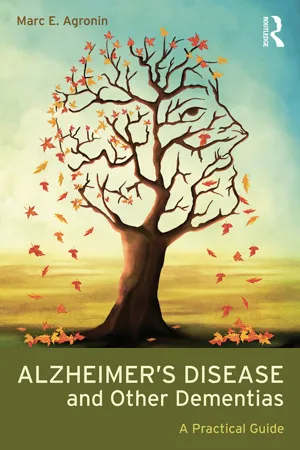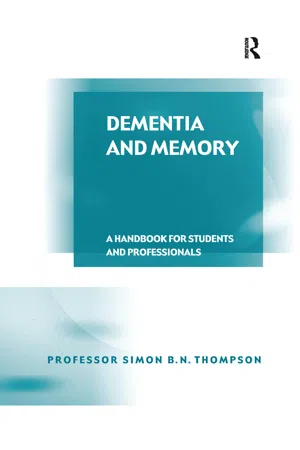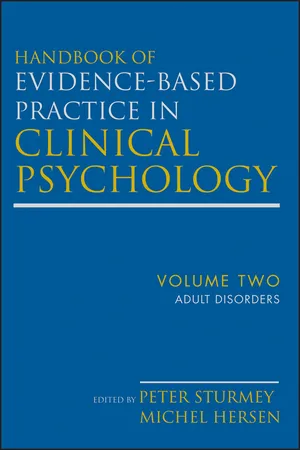Dementia
Dementia is a broad term used to describe a decline in mental ability severe enough to interfere with daily life. It is not a specific disease, but rather a group of symptoms associated with a decline in memory or other thinking skills. Common causes of dementia include Alzheimer's disease, vascular dementia, and Lewy body dementia.
5 Key excerpts on "Dementia"
- eBook - ePub
Wellbeing in Dementia
An Occupational Approach for Therapists and Carers
- Tessa Perrin, Hazel May, Elizabeth Anderson(Authors)
- 2008(Publication Date)
- Churchill Livingstone(Publisher)
...This provides a basis not only for understanding why certain symptoms are common amongst people with Dementia, but also for why we need to recognise the individuality of the person with Dementia. It is important that we do not assume that the Dementia is simply ‘global intellectual decline’ but undertake a careful assessments of both lost and preserved abilities in a person with Dementia. The chapter will also explain why brain damage must be set in a wider context that covers the person's past and present circumstances. The chapter will show how we can use knowledge about the brain, and in particular the organisation of memory functions, to move into the mind of the person with Dementia and take on their perspective of the world. This perspective is central to understanding the needs and behaviour of a person with Dementia and providing care that promotes their wellbeing. WHAT IS Dementia? The current definition of Dementia by the World Health Organization (1993), in the 10th edition of its International Classification of Diseases (ICD-10), is: ‘A syndrome due to disease of the brain, usually of a chronic or progressive nature, in which there is disturbance of multiple higher cortical functions, including memory, thinking, orientation, comprehension, calculation, learning capacity, language and judgement. Consciousness is not clouded. The impairments of cognitive function are commonly accompanied, and occasionally preceded, by deterioration in emotional control, social behaviour or motivation. This syndrome occurs in Alzheimer's disease, in cerebrovascular disease, and in other conditions primarily or secondarily affecting the brain.’ This definition makes it clear that the core symptoms of Dementia (that is, the problems with memory, the confusion, the difficulties with language and understanding, the changes in emotion and behaviour) are primarily due to damage to the brain...
- eBook - ePub
Dementia
An Attachment Approach
- Kate White, Angela Cotter, Hazel Leventhal, Kate White, Angela Cotter, Hazel Leventhal(Authors)
- 2018(Publication Date)
- Routledge(Publisher)
...However there is also an interest in documenting the psychosocial effects of Dementia on both patient, carer and families, and from that, developing psychosocial interventions to improve quality of life (e.g., Jensen et al., 2015). Summary Dementia is an umbrella term for a set of progressive, neurodegenerative diseases that can affect various cognitive domains, from mid-life onwards. The most common form of Dementia is non-inherited, late-onset Alzheimer’s Disease, which typically affects memory before other cognitive domains and for which symptoms are usually noticed late in life. Other, rarer forms of Dementia include the fronto-temporal Dementias, Posterior Cortical Atrophy, Vascular Dementia, and Lewy Body Dementia, many of which may be of young onset (prior to age 65) and some of which are inherited in an autosomal dominant pattern. There are clear guidelines for diagnosing the different Dementias, and for what help, support, and symptomatic treatment should be offered to both people with Dementia and their families, although in practice such help is not always sought or provided. Lack of awareness in the public and professionals, as well as limited resources, remain barriers to good practice. There is an increasing drive to increase awareness, and to pursue research into both drugs that might cure Dementia, as well as other interventions to improve symptoms and quality of life for people diagnosed with Dementia, and their families. References Alzheimer’s Society. (2014). Dementia 2014: Opportunity for Change. https://www.alzheimers.org.uk/downloads/download/1484/Dementia_2014_opportunity_for_change. Accessed 16 January 2018. Andrieu, S., Coley, N., Lovestone, S., Aisen, P. S., & Vellas, B. (2015). Prevention of sporadic Alzheimer’s disease: lessons learned from clinical trials and future directions. The Lancet Neurology, 4422 (15), 70–72. http://doi.org/10.1016/S1474-4422(15)00153-2 Balfour, A. (2015)...
- eBook - ePub
Alzheimer's Disease and Other Dementias
A Practical Guide
- Marc E. Agronin(Author)
- 2014(Publication Date)
- Routledge(Publisher)
...He stopped walking and relied on nursing staff for all of his daily needs. Many details of this case—a slow, insidious course; comorbid medical problems that led to further decline; and associated psychiatric problems, including depression, psychosis, agitation, and delirium—are typical for Dementia, especially AD. As this case illustrates, long-term care placement is a frequent result, since many individuals progress to a near vegetative state in which they are completely dependent on others for care. Definitions and Diagnostic Criteria According to the diagnostic classification in the Diagnostic and Statistical Manual of Mental Disorders, Fourth Edition, Text Revision, or DSM-IV-TR (American Psychiatric Association, 2000), Dementia refers to the development of multiple cognitive or intellectual deficits that involve memory impairment of new or previously learned information and one or more of the following disturbances: aphasia, or language disturbance; apraxia, or impairment in carrying out skilled motor activities despite intact motor function; agnosia, or deficits in recognizing familiar persons or objects despite intact sensory function; executive dysfunction, or impairments in planning, initiating, organizing, and abstract reasoning. These deficits result in significant impairment in both social and occupational functioning, and they represent a decline, often with an insidious onset and progressive course, from a previous level of functioning. As noted, the revised diagnostic nomenclature for the Diagnostic and Statistical Manual of Mental Disorders, Fifth Edition, or DSM-5 (American Psychiatric Association, 2013) replaces the term Dementia with major or minor neurocognitive disorder (NCD) to provide a broader definition. Whereas the DSM-IV-TR criteria for Dementia are patterned after AD, the DSM-5 criteria encompass a variety of potential forms of Dementia (in addition to delirium and amnestic disorders) and do not require memory impairment in all cases...
- eBook - ePub
Dementia and Memory
A Handbook for Students and Professionals
- Simon B. N. Thompson(Author)
- 2017(Publication Date)
- Routledge(Publisher)
...PART I Defining Dementia and Memory Chapter 1 Introduction to Dementia Background Increasing longevity, especially of people with learning disabilities (Jancar, 1984; Wolf & Wright, 1987; Eyman et al., 1987), has brought with it a seemingly ever-increasing demand on health and social services. In particular, clinical psychology services have seen an increasing number of referrals to assess older clients who have poor cognitive functioning and to provide advice for carers about clients who have declining memory ability (Thompson, 1994a). Supportive consultation with staff and clients alike is also important, and has increased the demands on all services as the size of the older population has grown. Identifying signs of declining memory and general cognitive functioning early on clearly has many advantages (see Huppert & Tym, 1986), including the planning and provision of specialist care for these people. Researchers and clinicians have been interested in the effects of ageing on the normal population for some considerable time (for example, Holden, 1989), and have compared common impairments, such as short-term memory (McDade & Adler, 1980), age-related memory decline (Young & Kramer, 1991), and psychophysiological differences, such as auditory event-related potentials (Muir, Squire & Blackwood, 1988). The difficulties of a differential diagnosis between depression and Dementia have also been examined (Warren, Holroyd & Folstein, 1989), but the stumbling block for researchers has often been the transferability of measures to different client groups (Rosen, Mohs & Davis, 1984)...
- Michel Hersen, Peter Sturmey(Authors)
- 2012(Publication Date)
- Wiley(Publisher)
...Chapter 6 Dementia and Related Cognitive Disorders BOB WOODS, LINDA CLARE, AND GILL WINDLE OVERVIEW OF DementiaS Diagnostic Criteria The two major internationally accepted diagnostic classification systems define Dementia as an acquired global impairment of cognitive function sufficient to impinge on everyday activities, occurring in clear consciousness (World Health Organization, 1993; American Psychiatric Association, 1994—currently under review). Both systems have a rather limited view of globality, essentially requiring at least one area of ability to be impaired in addition to memory—memory impairment being an essential component of the diagnosis of Dementia. Change from a previous level is a key part of the definition, and Dementias are usually expected to show progressive deterioration. At one time, the definition would specify that the condition is usually irreversible, but with increased optimism regarding therapeutic strategies, this aspect has tended to be dropped. Several different types and variants of Dementia have been identified, with three main disorders common in later life: Alzheimer’s disease, vascular Dementia, and Lewy body Dementia (LBD). In order to be certain of the type of Dementia present, a postmortem examination of the brain is required, and this has often been taken as the gold standard of diagnosis. During life, there are some differences in presentation between the Dementias: In LBD, hallucinations often occur early, there are fluctuations in performance, and memory does not stand out as the primary impairment; Alzheimer’s has an insidious onset and gradual progression, with memory and learning especially impaired; vascular Dementia shows a more step-wise decline, with periods of stability and recovery before further decline, and a patchy picture of impairment...




